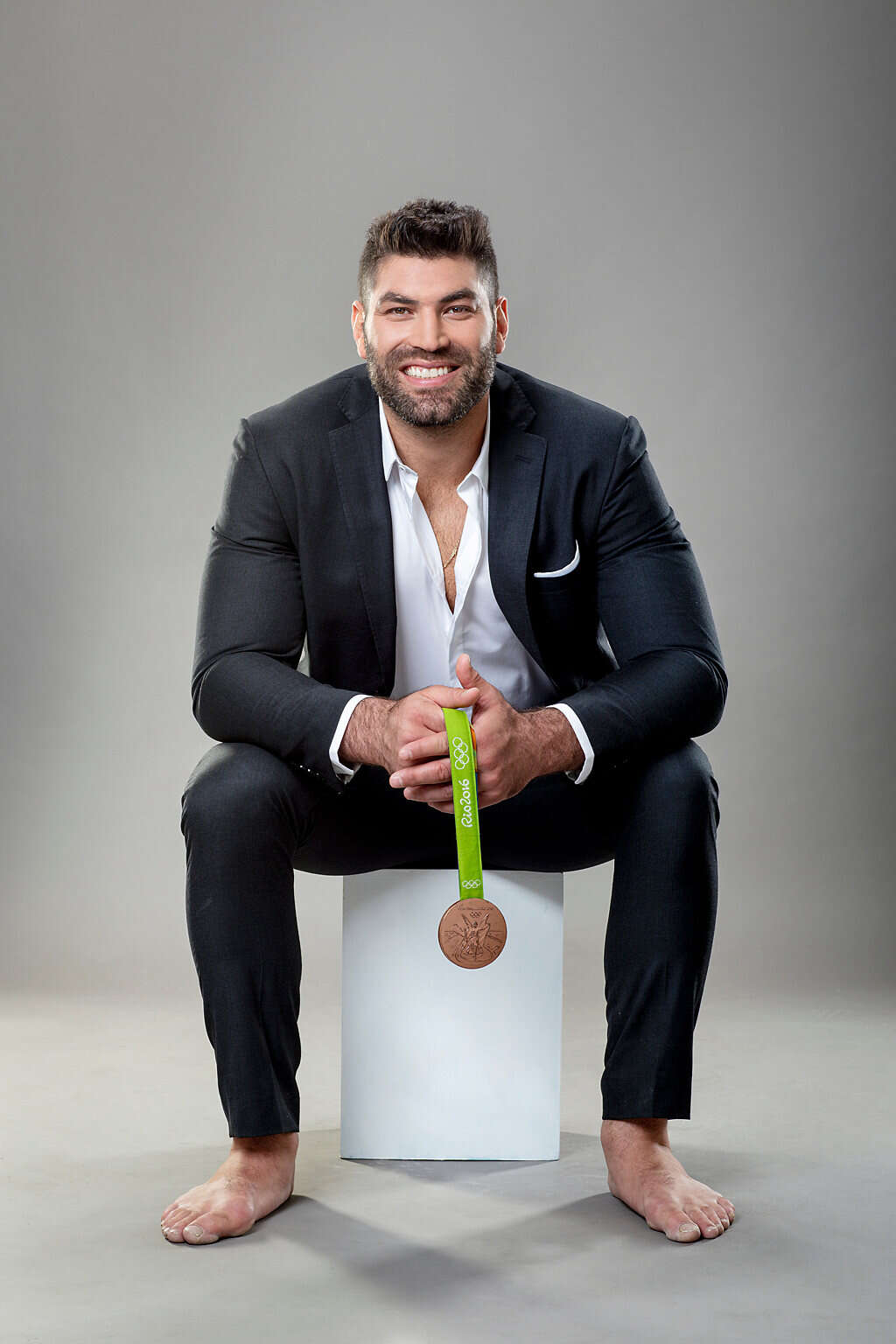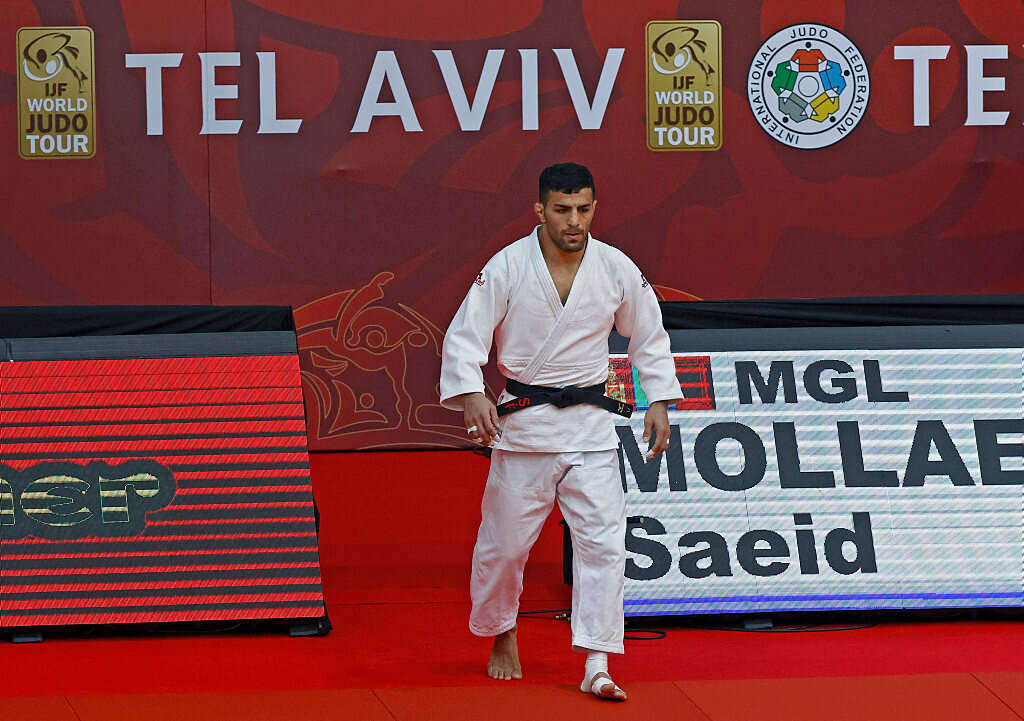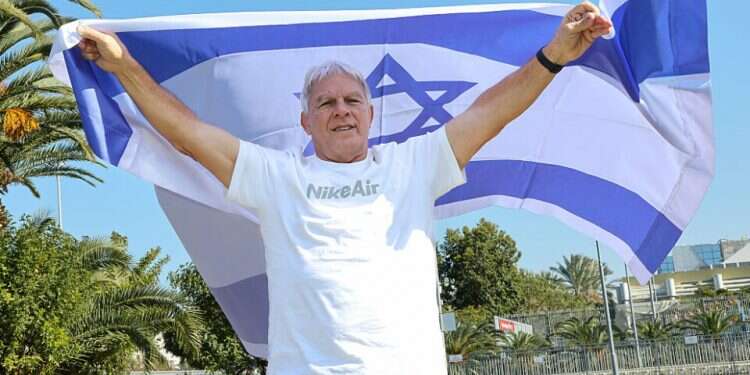Over the last few years, judo has become one of the most successful sports in Israel. At almost every competition it succeeds in bringing athletes to the podium, dozens of clubs with thousands of children have been established across the country, and in the recent campaigns at the Olympic Games in Rio and in Tokyo, it preserved the tradition of Olympic medals.
Follow Israel Hayom on Facebook, Twitter, and Instagram
Quite a bit of this can be credited to the President of the Israel Judo Association Moshe Ponte, who joined the association at the start of 2012, at the height of its collapse. Ponte succeeded in rehabilitating the image of the sport, stabilizing it financially and improving it professionally with the promotion of Oren Smadja and Shany Hershko as national coaches. Under his management, the judokas have participated in the European and World Championships, the Grand Prix, and the Grand Slam, and even made history by participating in competitions in the Gulf states while flying the Israeli flag, long before anyone had thought of the Abraham Accords.
Now, following the 2020 Tokyo campaign and at the start of the journey to Paris 2024, Ponte (65), who was Smadja's coach when he won an Olympic medal at the 1992 Barcelona Olympics, sits down for an exclusive and unrestrained interview with Israel Hayom.
"Speaking truthfully, I expected more at Tokyo," Ponte begins. "I am satisfied with everything that happened at the Olympic Games. We succeeded in winning a medal in the team competition, but there were things that didn't work like they were supposed to. We've learned lessons – and we'll fix it."
Q: What didn't work in the individual competitions?
"They competed against athletes who trained very hard, and we trained with intermediate athletes. During training, we didn't reach the Olympic level. During that time, we weren't able to hold overseas training camps, nor could we bring strong athletes here. From our perspective, it was a disaster, because our athletes need to work at the highest level possible. We needed more strong partners. Even under these circumstances, we succeeded in winning an Olympic medal. We raised up everyone there, we gathered them and we encouraged them, and everyone gave their all. All the people of Israel saw it."
Q: Who didn't do the correct work?
"It's impossible to accuse anyone, and it's also impossible to fix it. From this campaign, we concluded that anyone who's healthy needs to fly to every event, and on the other hand to hope that anyone who gets infected will get over the illness quickly and will return to training."
Q: There were some responses indicating that the team competition is less prestigious.
"Only the 12 best countries succeeded in qualifying for this competition, out of 100 who tried to meet the criterion during two years of competition. We succeeded."
Q: What's stopping us from becoming a power in world judo?
We're lacking 14–15-year-olds who will train like the number one in the country, who won't lack for anything. We need to train them to reach the top. I want to train a large cadre, who won't have a weights problem in any of the Olympics. When that happens, we'll start talking about a gold medal."
Q: Do you think that today the team is receiving everything it needs?
"Yes, but we still need sponsors for the intermediate level, so that the athletes will have the quiet they need to train. And also that they won't reduce our budget. Here we don't think about the long-term: you succeeded now, a little is given to you. You failed? We'll take a lot from you. It can't work like that. In addition, I think we need to build a national home for judo. I want our own home, where we can train and host countries for training camps where they can also stay. A home that will include dining rooms, restrooms, treatments, a psychologist's room, that they will have everything."
'I made a mistake when I reopened the criterion'
The competition season will start at the weekend with the Grand Prix in Portugal, and in February the Olympic team will also return to competition, starting with the Paris Grand Slam and afterward with the Tel Aviv Grand Slam, which is being hosted here for the second year running.
Q: What changes have you made in preparation for the campaign for Paris 2024?
"I made it clear that the athletes can't go abroad for another reason without my approval. After the games, they can do whatever they want. Whoever wants to be a star will be a star. Today Tal Flicker couldn't be in Ninja Israel. It was filmed before the Olympic Games when he knew that he wasn't going, but whoever wants to do something like that today – it won't happen, he'll be out. Everyone who is on the team now is focused on training, competitions, criterion, winning an Olympic medal. I always tell them that they don't need to chase sponsors. If you achieve something, the sponsors will chase you. If you lose, they'll forget about you."
Q: Ori Sasson already has two Olympic medals. Will you recommend that he continues for the next campaign?
"It's something I don't get involved with. Ori is an outstanding athlete, and in the coming months, we'll see what happens. In any case, he can contribute to the Israeli team, even if he retires. If he wants to train and to compete, he'll receive everything he needs. As long as it doesn't happen, he doesn't belong to the team."

Q: Is there anything you regret, that you would have done differently, throughout your whole time at the association?
"The World Championships last June should have shown me the athletes' situation, no matter if they're winning or losing. They really worked hard, but we trained with each, and a red light should have gone off that we need to train under different conditions in order to improve."
Q: And what about the internal struggle between the weight classes? This time, how do we avoid reaching a situation where it's decided upon at the last moment?
I also regret that I didn't make a decision. I should have dealt with the Olympic committee, that the best who can win a medal will fly to Tokyo. This time there won't be struggles. In March 2024, the moment that I know who the best is – it's over. In March 2021, before Tokyo, I reopened the criterion and that was my mistake. Everyone who should have been at the Olympic Games was there, apart from one weight class."
Q: After Tokyo do you think gymnastics is now the most successful Olympic sport in Israel?
"No. There are two athletes who don't know what they'll do in two years' time. Our success is in preserving the tradition. I hope there won't be a situation where they will wait for us there for 12 years, like what happened to us in 1992."
'Yael Arad. She doesn't bother me and I don't bother her'
Q: You succeeded in bringing to Israel almost every competition that you wanted. Are there more dreams?
"Of course, the World Championships. I intend to bring it to Israel in 2025. It's not a problem of money, I believe that the state will provide the money."
Q: And do you want to see Iranian athletes at these World Championships?
"An Iranian delegation at the World Championships in Israel is my dream. They have athletes who defected from Iran and they will definitely come, like Saeid Mollaei or those who competed in the Refugee Olympic Team."

Q: If the President of the Iranian Judo Associate reads this interview, what's your message to him?
"I want to travel to tell him that I want to invite him to come to the World Championships in Israel. That he'll come here with his athletes and we will respect them, that there's nothing to be afraid of, that he'll be received with open arms, and I understand what's hiding behind sport, but here it doesn't happen.
We sat in Israel with former Prime Minister Benjamin Netanyahu, with the International Judo Federation President Marius Vizer and the Minister for Sport Miri Regev – and he promised that whoever wants to come to Israel, also from Iran, everyone will come and compete. I believe that Prime Minister Naftali Bennett will also agree with this because ultimately we're doing sport and not war."
Q: Many things over the last few years couldn't have happened without the International Judo Federation President Marius Vizer.
"He fought for the truth and for the values in sport. As well as this, we have excellent relations. He sees the achievements and he understands that something is happening here. Nothing would have happened without him."
Q: What do you think Israeli sport lacks today?
"There are no shortcuts to achievements. There is a feeling here that coaches lose their way and want to cut corners and then everything ends at age 18. We need to learn the way, training properly, not only in judo – in all the other sports. We want results already at a young age. The transition from junior to adult needs to be done gradually, it can also break people mentally."
Q: And there are always a number of problems with the army.
"I really hope that the army will recognize the outstanding athletes. It's their three most important years. There's no point in giving them the status of active athletes if they're not training. It's wrong to delay them, it's their time to advance, and some of them will also compete in the training of Olympic athletes. There needs to be someone in the Ministry of Sport who only deals with this."
Subscribe to Israel Hayom's daily newsletter and never miss our top stories!
Q: What do you think about the role of the Minister of Sport Hili Tropper?
"Minister Tropper wants the best for sport. I understand that he brought bigger sums and I hope that he will distribute them appropriately. So he raised more but on the other hand, he reduced the judo budget by nearly a million shekels. Why did he need to reduce our budget? I don't understand it. A sport like gymnastics, even if it doesn't win a medal now in Paris, we don't need to reduce its budget. Just the opposite, it's a sport with infrastructure, with active members. We need to give them the chance to do their best. We shouldn't hurt those who succeed. We need to give them the security that they won't be harmed, that they will continue and that they will know they also have a security blanket for Los Angeles 2028."
Q: Where will we see you in another four or view years? Still as the head of the association?
"If after Paris someone suitable will come to replace me, I'll happily clear the way, even though I can stay. I have the motivation, I'm interested in continuing to fight. I've got a lot more to give."
Q: And if there will be an offer to go into politics?
"Me as a politician? I had many offers to run for office, but I don't know how to do it."
Q: And what about the role of the Israeli Olympic Committee President?
"That's not interesting at all, until the control in the centers will go to the Olympic sports. Today I can influence from the outside. I learned one thing – people don't want change. They don't even choose, they appoint. Hapoel, Maccabi. It doesn't matter. What I did with judo I could have also done with other sports."
Q: Now that Yael Arad is the head of the committee, do you think she'll help judo more?
"Not at all. I don't expect anything. She doesn't bother me and I don't bother her."
Q: How many medals will the team win in Paris 2024?
"One, maybe. I kept the promises I made up until now. I believe in our athletes. Everyone who was in Tokyo can also do it in Paris, and those who weren't there will want to do everything to be in their place. There needs to be competition between them."




